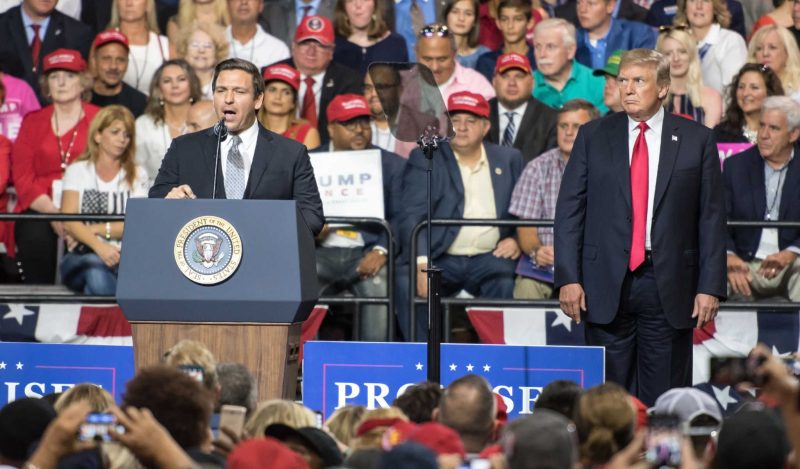According to an ABC/Ipsos poll conducted on 9–10 June, President Joe Biden has a net unfavourable rating of 21 (31-52) and former President Donald Trump of 25 (31-56). It is entirely conceivable, therefore, that they could both lose their quest for their respective party nomination, as indeed was suggested by Karl Rove in his Wall Street Journal column on 7 June.
Robert F. Kennedy, Jr. and Ron DeSantis are among the wide field of candidates contesting the Democratic and Republican Parties’ primaries. Either of them being the nominee will turn next year’s presidential contest into a Covid reckoning election. The primary season is already shaping up as one.
Meanwhile, permit me a moment of schadenfreude at this week’s news that a lockdown fanatic former leader, Nicola Sturgeon of Scotland, was arrested by police in an unrelated financial scandal, questioned, and then released.
And a second moment of satisfaction that on Sunday 12 June, Novak Djokovic won the French Open title for the third time. This increases his majors tally to 23, putting him in front of any other man in tennis history, making him the only man ever to have won all four majors at least three times, and returning the world number one ranking to him as well. Justice has been served against the Australian and US governments that deported him and banned him from entering the country to play in their respective Open competition because of his unvaccinated status.
At a Covid Crossroads
We seem to have come to some sort of a crossroads with respect to Covid. Along one road lies a wealth of studies demonstrating the negligible benefits of most of the key pharmaceutical and non-pharmaceutical interventions. In May the US finally ended its ban on unvaccinated foreigners’ entry into the country.
A study by Kevin Bardosch used a “harm framework” to look at 600 publications. He concluded that “the collateral damage of the pandemic response was substantial, wide-ranging and will leave behind a legacy of harm for hundreds of millions of people in the years ahead,” exactly as many of us warned from the beginning.
Swedish researchers looked at nearly 3 million women to conclude that vaccinated women over 45 have a 23-33 percent higher risk of severe vaginal bleeding. A finding published recently in Nature showed that the risk of blindness (retinal vascular occlusion) in the two years after mRNA vaccination increased by 2.2 times.
In June a major peer-reviewed meta-analysis from the Institute of Economic Affairs by US, Swedish, and Danish researchers concluded regarding stringent lockdowns that, in the words of co-author Steve Hanke, Professor of Applied Economics at The Johns Hopkins University, “the lives saved were a drop in the bucket compared to the staggering collateral costs imposed.” In his judgment, “When it comes to Covid, epidemiological models have many things in common: dubious assumptions, hair-raising predictions of disaster that miss the mark, and few lessons learned.” The comprehensive 220-page book found that draconian measures had a “negligible impact” on Covid mortality and were “a colossal global policy failure that should never be imposed again.”
In a more accessible Brownstone Institute article, Jeffrey Tucker summarises his “twenty grim realities” of lockdowns. An article in Vaccines indicates that repeated Covid injections induce the production of IgG4 antibodies that may reduce immunity to the Covid spike protein. This would help to explain rising infections, hospitalisation, and deaths with successive doses of the vaccines.
A Virginia study, for example, found that vaccinated veterans are more likely to be hospitalised or die than unvaccinated veterans, with boosters raising the risk even higher.
FDA researchers found elevated risk of heart inflammation in children aged 12–17 who had been injected with the Pfizer vaccine. South Korean researchers recently established that 12 people under the age of 45 died from myocarditis caused by mRNA vaccines. By contrast, Israel’s health ministry confirmed that the number of people aged 18-49 without underlying diseases to have died from Covid is precisely zero.
Julie Sladden and Julian Gillespie wrote about the accidental discovery that Covid injections could contain plasmid DNA. They warn that if the
findings are verified, the implications are serious. Widespread DNA contamination would bring into question the quality of the entire mRNA injection manufacturing process, safety systems, and regulatory oversight. In addition, DNA might not be the only contaminant.
Yet, on another path going forward, there remain many disquieting indicators of the continuing hold that the failed and discredited narratives have on policymakers and publics. This suggests that the insanity could be serially repeated at short notice. Only 34 percent of British people believe the pandemic is over and 56 percent think it’s ongoing, according to a mid-April YouGov poll.
Following Rochelle Walensky’s resignation, Biden’s pick as the new CDC director, Mandy Cohen, is a lockdown, mask, and vaccine fanatic. On 14 August 2020 she tweeted a photo of herself wearing a mask imprinted with a portrait of the execrable Anthony Fauci. Many of the worst offenders on lockdown, masks, and vaccines have been honoured with gongs while the likes of Oxford University’s Carl Heneghan and Stanford’s Jay Bhattacharya were monitored by the UK government’s Counter-Disinformation Unit and heavily censored on social media. Governments remain stubbornly resistant to investigating the concerning phenomenon of excess deaths showing up in many countries.
On 5 June, the WHO and the European Commission announced the launch of a landmark digital health initiative for creating global vaccine passports. It’s not clear how this meets the UNESCO Statement on the Ethics of Covid-19 Certificates and Vaccine Passports (30 June 2021) which insists that (1) “the certificates should not infringe freedom of choice regarding vaccination,” and (2) they must “deal responsibly with the uncertainties regarding the degree of protection provided by specific vaccines and past infections.” North Korea’s election to the executive board of the World Health Organiztion has sparked outrage in many quarters.
Yet a more sinister long-term threat to individual liberties and global freedoms is the WHO push for a new global pandemic treaty and amendments to the existing International Health Regulations that would grant it legally binding authority over national governments.
The Assault on Liberties, Freedoms and Human Rights
President Dwight Eisenhower’s warning, in his farewell address of 17 January 1961, of “the military-industrial complex” (note the use of the definite article) is one of the most quoted phrases of any US president. Little noticed in the same speech was the warning of another danger that has come to pass in the last three years: “The prospect of domination of the nation’s scholars by Federal employment, project allocations, and the power of money” such that public policy could … become the captive of a scientific-technological elite.”
Trump continues to live rent-free in the heads of those afflicted with the Trump Derangement Syndrome. Thus the Australian’s Troy Bramston wrote recently that “The risk that he poses to US democracy and the rule of law, should he reclaim the presidency, is so grave that it cannot be ignored or discounted.”
A second term for Trump is a greater threat to US democracy and the rule of law than Democrats and the media running the fake Russia collusion hoax that destroyed the first term of a duly elected president? Than the MSM, social media, and Big Tech running protection for Biden by actively suppressing the true Hunter Biden laptop scandal before the last election? Than the censorship industrial complex? Than 50—fifty!—former top intelligence officials intentionally misleading American voters about that laptop in order to put all their thumbs on the electoral scale? Seriously?
In fact the biggest attack on democratic governance affecting the liberties, freedoms, and rights of the biggest number of peoples in all of human history was carried out by the overwhelming majority of governments across the Western world. On the first day of hearings on 13 June, the UK Covid inquiry was told that authorities had given very little thought to the “potentially massive impact” of restrictions on civil liberties.
Writing in The Mail on Sunday on 3 May 2020, Lord Sumption, the recently retired UK Supreme Court Justice, said that Covid-19 was neither “the greatest crisis” nor even “the greatest public health crisis in our history. But the lockdown is without doubt the greatest interference with personal liberty in our history.”
In the more substantial hour-long Cambridge Freshfields Law Lecture on 27 October 2020, he doubled down:
During the Covid-19 pandemic, the British state has exercised coercive powers over its citizens on a scale never previously attempted…. It has been the most significant interference with personal freedom in the history of our country. We have never sought to do such a thing before, even in wartime and even when faced with health crises far more serious than this one.
Sumption was able to speak his mind with freedom as an ex-judge. Neil Gorsuch was more constrained as a serving US Supreme Court Justice but even he has now broken his silence. On 18 May he wrote, echoing Sumption across the Atlantic: “Since March 2020, we may have experienced the greatest intrusions on civil liberties in the peacetime history of this country.” After listing the catalogue of intrusions, he concluded:
The concentration of power in the hands of so few may be efficient and sometimes popular. But it does not tend toward sound government….
Decisions produced by those who indulge no criticism are rarely as good as those produced after robust and uncensored debate. Decisions announced on the fly are rarely as wise as those that come after careful deliberation. Decisions made by a few often yield unintended consequences that may be avoided when more are consulted.
The Primaries Could be Circuit Breakers
The lens of how various leaders managed the pandemic therefore helps us to frame the contest in terms of their respective culpability in enabling and facilitating the grave attacks on freedoms, on the one hand, and their capacity and willingness to resist and reverse the blanket of authoritarianism that has suffocated liberal democracies since 2020, on the other. Because of the dominant influence of America on the rest of the democratic world, the US presidential contest has unique global resonance, even though the rest of us lack a vote in the contest whose outcome has the potential to shape our lives quite profoundly.
From this perspective, for someone who strongly resisted the insanity of the public policy response to a serious but not existential global health crisis, the ideal Republican and Democratic champions would be DeSantis and Kennedy. No one else comes close in the two parties to their record in forceful opposition to lockdowns, masks and vaccines.
If DeSantis and Kennedy were to triumph in the primaries against the odds, it would mean the campaign became a referendum on Covid for the voters of both major parties. It would further signify that the two heroes of the Covid resistance won the public debate, and whoever is elected president come November 2024 will have a clear mandate to revert to pre-Covid normalcy.
Many political leaders bowed to the demands of public health experts based on a combination of incompetence (for example in failures to prevent large-scale fraud and rorts [Australian vernacular: fraudulent or dishonest acts or practices “to take unfair advantage of a public service”]), malfeasance (for example in awarding no-bid contracts to personal and party cronies), scientific illiteracy, cowardice (for example Boris Johnson’s capitulation to masks in schools because he feared Scotland’s leader exploiting the issue politically), and laziness (Johnson is Exhibit A). A recent analysis by Associated Press found that, in “the greatest grift in US history,” $280 billion in US Covid relief funding was stolen by fraudsters and another $123 billion was wasted or misspent.
The political implications of DeSantis and Kennedy’s successful challenge against the establishment narrative on all things Covid would reverberate in many other Western democracies and encourage other major parties to differentiate themselves from the ruling establishment as lockdown and vaccine sceptics and opponents.
That is a three-for-one win for all the original sceptics: what’s not to like?
Present Portents and Future Trajectories
But how likely are the challenges, from DeSantis to Trump and Kennedy to Biden, to succeed? At present both are miles behind the two front-runners Trump and Biden. On the RealClearPolitics (RCP) poll of polls, as of 10 June, Trump was 31 points ahead of DeSantis and Biden was 42.5 points in front. The betting averages are even more lopsided: 57-27 for Trump over DeSantis and 69-7 for Biden over Kennedy. However, both DeSantis and Kennedy are well clear of other candidates. Considering both have only recently declared, this is a promisingly solid base on which to build.
Biden vs. Kennedy
Democrats have been unsettled by the visibility, profile, and solid base of support for Kennedy the moment he announced his candidacy. Crucially, on many character and judgment attributes, voters rate Kennedy higher than Biden. His favourability rating in the Echelon poll in May was 4 percent higher than Biden’s and unfavorability rating was 36 percent lower, giving him a massive 40 percent net advantage. Little wonder that Republican political consultant Douglas MacKinnon believes that Kennedy will be the Democratic nominee.
Of course, the media continues to smear Kennedy for kooky conspiracy theories even as many have come true. However, should Kennedy sustain a 20 percent or higher polling nationally, the media silence on his candidacy will become harder to sustain. The decision by CBS news to air the Hunter Biden laptop story in late May has been compared to the iconic Walter Cronkite break from the media pack in the optimistic assessment of the Vietnam War in 1968. That had marked the beginning of the end of Lyndon Johnson’s political career.
Biden is vulnerable to attacks from Democratic opponents during the primary as well as a Republican opponent in the presidential election. Contradicting his marketing in the 2020 election as a moderate conciliator and unifier, he has governed as a radical race-baiter who has deepened the nation’s polarisation. The rate of immigration across the southern border is a virtual demographic invasion and the Democrats’ soft-on-crime policies have become political millstones for many candidates. His physical presence around young girls stirs distaste and unease and he is an out-and-out fabulist.
The chaotic and humiliating exit from Afghanistan and Biden’s many gaffes, stumbles, and falls will be exploited ruthlessly to deepen the already substantial doubts over his fitness to run the country. Most critically, the RCP polls show a net disapproval of Biden’s job performance by 55-42 and a net disapproval of the direction of the country by a whopping 66-23 margin.
Trump vs. DeSantis
In contrast to Kennedy, DeSantis already commands national attention and this will grow now that he has declared his candidacy. Trump has never before come up against a Republican opponent with such a substantial record of accomplishments, nor one as well-funded and well-prepared. DeSantis gained national profile for converting a marginal 0.4 percent victory in 2018 into a 19.4 percent landslide in 2022, turning America’s biggest swing state from rosé to ruby red. That is a striking contrast with Trump’s string of successive losses since 2016. The substantial influx of Americans from other states into Florida is high-visibility impressiveness and confers undeniable bragging rights.
For most of this year, the focus of Trump’s ire and schoolyard insults-by-name-calling has been DeSantis. Because the biggest claim to national fame by the Florida Governor is his decisive leadership on Covid where he forcefully rejected and rebutted the advisories from Fauci & Co., Trump has decided to take down DeSantis on that very score.
Efforts by Trump to puncture the popularity of DeSantis among hardcore Republicans is more likely to rebound on Trump himself than damage the Governor. Conservative-leaning Americans, independents, and even traditionally Democratic cohorts like mothers and family-centric ethnic groups have noted how DeSantis has fought back hard and successfully against the metastasizing woke ideology that has quickly populated all the major civic and political institutions.
He famously declared “Florida is where woke goes to die” after his triumphant re-election last November. Then there is the déjà vu sense of despair at the prospect of a Biden-Trump rerun and the contrast between the 77-year old ex-president and the 44-year old aspiring president.
The Republican base loves DeSantis, if less than Trump, and reviles former New York Governor Andrew Cuomo. In his desperation to wound DeSantis on Covid, Trump has gone full-on Cuomosexual, turning the two into besties with benefits. In a one-minute video rant, Trump accused Florida of having the third-worst Covid death rate in the US. “Even Cuomo did better, he was number 4.”
Put aside the typical looseness with facts and the reality that Trump himself moved to Florida. On the raw figures at Worldometers, the US national average is 352.5 deaths per 100,000 people. Florida is tenth-worst with 412.1 deaths/100k and New York ranks 16 with 399.1 deaths/100k.
However, in late May the CDC published a state-by-state analysis of age-adjusted Covid mortality (generally accepted as a more accurate mortality metric). The national average as of 1 June 2023 was 282.9 Covid deaths per 100,000 people. Florida ranked a lowly 36 among the 50 mainland states with 245.2 deaths/100k, compared to New York’s 311.7 deaths/100k that put it at number 17.
Trump’s instincts, like that of Boris Johnson in the UK, may have been libertarian. The fact remains that both leaders allowed themselves to be manipulated into policies that have produced disastrous consequences and both must be called out and held accountable.
By giving Covid such a high profile, Trump paints a target on his own back for DeSantis to shoot at. The most lethal arrows in the Governor’s quiver are how he stood up to Fauci while Trump failed to fire him. DeSantis attacked Trump for turning over the country to Fauci in March 2020 that “destroyed millions of peoples’ lives.”
Good leaders pick highly capable aides and work well with them over many years and even decades. Trump is notable for the rapid turnover of pretty much all his close and top hand-picked aides. He demands total loyalty but gives none in return. Most recently he turned his bile on his popular and decorous former press secretary Kayleigh “Milktoast” McEnany. She hadn’t even criticised him.
In the familiar story set in the Middle East, a scorpion that stings the frog that is giving it a piggyback ride across swollen waters to safety, thereby ensuring both drown. Asked by the frog to explain the logic behind this suicide-murder, the scorpion says it stung because that’s who she is, stinging is in her DNA and she can’t help it.
Trump seems to be quite a bit like that: he just cannot help himself.
DeSantis believes that Trump could well win the Republican nomination but is not electable thereafter, whereas he is; that many of Trump’s policy achievements in 2017–20 have been reversed by the Biden administration; and that the reversals could become long-lasting if the party fails to recapture the White House next year.
The Indictment Wild Card
Trump’s indictment on 9 June for holding classified documents throws a monkey wrench into all existing calculations. Will it derail his candidacy or solidify support in anger at the Democrats’ weaponisation of the criminal justice system? The indictment is another milestone on the road to the, possibly irreversible, politicisation of the US legal system. This—the first criminal indictment of either a former president by the administration of his opponent from the other major party, or of the leading contender for the presidency by the incumbent—is doubly fraught for the long-term health of US democracy.
With two criminal indictments of Trump, the protective shield has been well and truly lifted from former presidents. Do the Democrats understand the wind they have sown to reap the whirlwind? We can expect a descent into cycles of retaliatory indictments of defeated opponents and challengers by victorious presidents.
Second, with the blatant abuse of the prosecutorial power of the federal government increasing numbers of Americans will come to regard the administration as illegitimate.
No amount of deflections about whataboutery will stop people from comparing the kid glove treatments of Hillary Clinton with the email server scandal, and of Vice President Biden’s equally cavalier approach to classified documents, a contrast that seems even more partisan once the Presidential Records Act is factored in. According to Michael Bekesha, the lawyer who lost the Bill Clinton “sock drawer” case, the Act “allows the president to decide what records to return and what records to keep at the end of his presidency. And the National Archives and Records Administration can’t do anything about it.”
For some, for example South Carolina Republican Rep. Nancy Mace, the timing is also suspicious as it comes amidst further revelations about possible bribery involving Biden when he was vice president. The indictment conveniently deflects attention from the Biden family pay-to-play scandals involving the vice president.
If Trump triumphs in the primary but loses the 2024 election, tens of millions of Americans will be convinced, with more plausibility than in 2020, that the creeping criminalisation of presidential politics crippled Trump’s campaign and robbed him of a second term. If Trump wins despite or perhaps with an assist from the brazen weaponisation of the criminal justice system, he will begin the second term as a defendant in possibly several criminal cases.
Having treated him as an illegitimate president in his first term, Democrats, lawmakers and voters alike, will deal with him with even more obvious disdain and contempt instead of with the respect due to the office. Added to the reality of the next term being the last for either man, the taint of domestic illegitimacy will hobble the conduct of US foreign policy as well.
My, how the mighty United States has fallen.
Published under a Creative Commons Attribution 4.0 International License
For reprints, please set the canonical link back to the original Brownstone Institute Article and Author.









